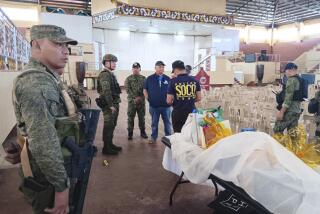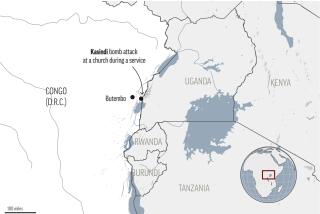Manila-Muslim Rebel Truce Frays
- Share via
MANILA — The fragile truce forged last week by President Corazon Aquino and the leader of a Muslim secessionist movement appeared to be fraying Tuesday after Philippine military commanders blamed Muslim rebels for a grenade attack on a Roman Catholic church on the island of Mindanao.
The attack took place early Sunday in Salvador, 550 miles south of Manila, as a Roman Catholic parish priest was reading the wedding vows to a young couple.
According to military authorities, five Muslim terrorists burst into the church, rolled a hand grenade down the aisle and blew up the altar, killing 10 people and wounding the bride and more than 90 others.
Government forces shot and killed two of the attackers as they fled the church, and Col. Raul Aquino, commander of the regional infantry division, identified the men Tuesday as members of the Moro Islamic Liberation Front.
The front, which military intelligence officials say has about 1,500 armed regulars, is one of several Muslim groups that for 14 years have been waging war on the government. Their goal is to create a separate Islamic state on the southernmost islands of Mindanao, Sulu and Tawi-Tawi.
Catholics Outraged
The church attack has outraged the nation’s Catholic majority, and Pope John Paul II issued a statement at the Vatican calling the attack “a particularly vile form of terrorism.”
Just two days before the bombing, in a move described as a significant step toward peace, President Aquino traveled 600 miles to Sulu to meet with Nur Misuari, leader of the Moro National Liberation Front, the largest Muslim faction.
At their meeting, the two leaders agreed to “a temporary cessation of hostilities” between the government and the Muslim rebels, and they created a negotiating panel that is expected to propose wide-ranging autonomy for the Muslim-dominated areas of the southern Philippines.
Misuari’s 5,000 or so armed supporters hailed the accord and vowed to keep the peace in the region, but military authorities and Misuari himself were concerned that other Muslim factions would try to sabotage the agreement.
Even before the talks took place, leaders of the Moro Islamic Liberation Front had announced that they would not honor any accord reached by Misuari.
Letter Sought Role
Haj Murad, a senior Islamic front commander, said in a letter to Aquino dated Sept. 3 that “any step taken towards (a cease-fire) without the participative involvement of MILF Chairman Salamat would not be binding on our moujahedeen, or freedom fighters. . . . The conflict can only be solved with the involvement of all concerned.” The chairman of the Moro front he referred to is Hashim Salamat, the group’s exiled leader.
The church bombing was not an isolated incident. At the same time, saboteurs blew up a power transmission tower in the same province, blacking out four provinces and two key cities. A military report on the incident blamed it, too, on the Moro Islamic Liberation Front, whose operations are based in the province of Lanao del Norte.
Signaling the government’s concern over the incidents, the military chief of staff, Gen. Fidel V. Ramos, ordered an investigation into the bombings and deployed several companies of infantry to discourage future attacks.
More to Read
Sign up for Essential California
The most important California stories and recommendations in your inbox every morning.
You may occasionally receive promotional content from the Los Angeles Times.













